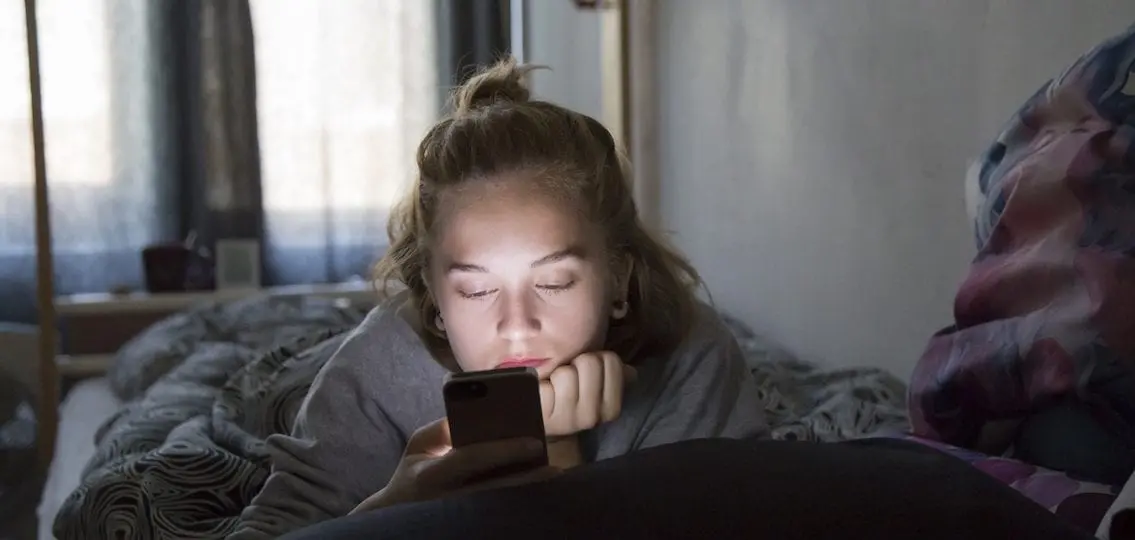When my children were toddlers, I was thrilled to have a DVD player in the back of our car to keep them occupied on road trips. I’d pop in Caillou or Sesame Street, and we were on our way. Now my kids are teenagers and they spend road trips glued to their phones, while I implore them to look up and gaze out the window.

Like many parents, I’m constantly reevaluating the household rules around tech. There are times I wish I could go back in time and set stricter guidelines. For instance, I wouldn’t allow screens in bed. And then I wonder: Is it too late to backpedal?
Resetting the Ground Rules for Tech Use
It’s okay to reconsider
“I think I’d want to re-frame from backpedal. Say that as a parent you’ve found new information or come to the realization that the decision you made wasn’t a good one, and you need to make a change,” advises Dr. Richard Freed, a child and adolescent psychologist and the author of Wired Child: Reclaiming Childhood in a Digital Age.
It’s okay to tell our kids that in an ideal world, we parents would have gotten it right the first time, adds Freed. But we aren’t perfect, and we’re responding to new health information about tech—which comes out almost daily.
The natural progression is to loosen tech freedoms as kids get older, but that’s not always realistic, says Dr. Devorah Heitner, author of Screenwise: Helping Kids Thrive (and Survive) in Their Digital World. The best approach is to talk to your child about why you’re making the change.
“You can say, ‘Hey, remember you had that bad experience with XYZ? We’re going to rethink this,’” says Heitner. “I’ve watched TV shows with my son and a scene comes on and I might say, ‘Wow, maybe we shouldn’t be watching this.’ I might ask him, ‘Does torture happen a lot on this show? That’s pretty scary.’”
Ultimately, you make the decision as a parent, but you can discuss your reasoning with them.
As any parent who’s tried to negotiate with a teenager knows, they are like mini-lawyers. They can be relentless in refuting every argument. In some cases, a parent simply needs to put their foot down.
“If it’s really important, like not watching pornography or not staying up all night on screens, then you have to fight to win. Don’t budge,” Heitner advises.
She adds that it’s bad precedent for parents to walk back every rule, and she cautions that if parents ban everything, kids will think it’s unreasonable and simply lie about their tech use.
The big picture: Changing tech rules
Whether setting new rules or walking back established ones, parents might want to remember how enticing these devices are, and not just for teens. Just as yesterday’s teens spent hours talking to friends on the telephone, today’s teens use their devices to forge and maintain social bonds. In a 2018 Pew Research Center study, 81% of teens said social media helped them feel connected to their friends.
Due to what he calls the “unhealthy seductive power” of tech, Freed says parents need to assess how their child is going to react to a redrawing of the lines around screen freedoms.
“If they believe it may lead the child to become unsafe, then involving professional help may be needed,” Freed says.
For some kids, tech can take the place of family, so if parents limit access to devices, they may need to step up and connect more with their kids, Freed added. Also, make sure all adult caregivers are on the same page.
Regardless of the approach taken, parents who dial back their teen’s tech use will likely encounter pushback. It’s a teenager’s job to push the boundaries. But Freed reminds parents to understand that teens often can’t make effective choices on their own and need our help.

“Be willing to make tough decisions, and don’t expect kids to say they like what you’re doing,” Freed says. “Often, the thanks may not come until kids are older and they realize effective parenting helped them achieve their own goals.”



